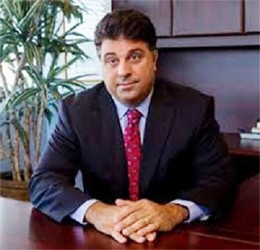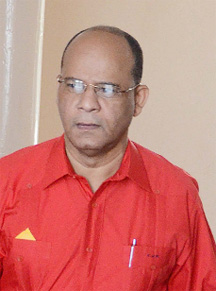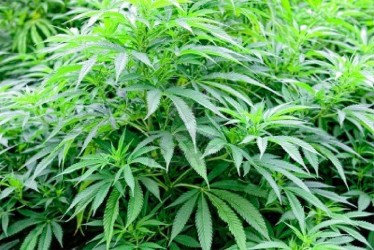The Government of Guyana has more or less slammed the door shut against the legalization of marijuana but there are other opinions on the subject amongst politicians and businessmen in the region and many of those are diametrically opposed to the prevailing official opinion here.
One of the more recent pro-legalization cases made in the region has emanated from Jamaica – widely regarded as the regional home of ‘weed.’ What is interesting is the fact that the argument was not made by a dread-locked Rastafarian, but by Joe Issa, one of Jamaica’s most prominent entrepreneurs.
In February, Issa secured a healthy measure of local and regional attention when he declared that medical marijuana could be important to the economic future of Jamaica.

Joe Issa
The story that made the rounds in the region was reportedly published first in the January 9, 2015 issue of Jamaica’s North Coast Times newspaper. It quotes Issa as saying that “it [marijuana] may be the country’s economic legacy.”
Issa, according to the article, sees marijuana as a “once in a lifetime opportunity” which “must be grabbed, nurtured, protected, administered and monetized.”
What makes this recent lobby for the legalization of marijuana interesting is that its advocate sees it as an economic boon for Jamaica rather than a facility that will simply allow pleasure-seekers to indulge without restraint.
Issa’s view on the legalization of marijuana comes as the authorities in Kingston are actually examining steps towards the legalizing marijuana for the purpose of creating medical and other products that can be marketed.
Nor is Issa alone among prominent Jamaicans in advocating the legalization of marijuana. In fact, in a blog post on the NORML website on June 13, 2014 titled ‘Jamaica: government promises relaxation of ganja possession laws’, NORML Deputy Director Paul Armentano, quotes Justice Minister Mark Golding as saying that a majority of Parliament was in favour of separate legislation to expunge the criminal records of persons with minor marijuana convictions and that additional legislative efforts are also underway to develop a legal framework which will allow the emergence of medical ganja and industrial hemp industries in Jamaica.
Last October, Golding steered the Jamaican Parliament into passing the Criminal Records (Rehabilitation of Offenders) (Amendment) Act 2014 and by year-end had legislation been drafted to make the possession of small quantities of ganja a non-arrestable, infraction, and allow the possession and use of ganja for scientific research, religious and medical purposes.

Golding, like Issa, is a prominent and respected businessman in his own right and reportedly belongs to a growing group of respected, even middle class Jamaicans who continue to evince less interest in the ‘high’ that comes from smoking marijuana and more in its potential to realize the economic transformation which they believe can come from its cultivation for export and the development of products for medicinal purposes.
Other Caricom territories may well baulk at the pace at which Jamaica is travelling down the marijuana road though Jamaica’s businessmen and politicians may well argue that the time has come to take a hard-nosed view on the issue of legalizing marijuana.
No such liberal views on the legalization of marijuana are likely to emanate from the authorities here and Home Affairs Minister Clement Rohee, clearly chastened by the failure of the Guyana Police Force to bring drug-trafficking and other drug-related crimes under control has made clear the government’s zero tolerance of anything even remotely resembling the legalization of marijuana.
Rohee went as far as declaring that the present administration is not even prepared to negotiate with those who might wish to talk about legalization and that is despite his awareness of the fact that elsewhere in the region the debate on the medical virtues of marijuana and what is seen in some quarters as an existing case for legalization is already gathering pace. His position, and by extension, the administration’s, is that for medical purposes or otherwise, there will be no negotiation on the legalization issue.
Rohee is aware, of course, that he is batting on what cricket enthusiasts would describe as a ‘good’ wicket. Sections of Guyana’s relatively small Rastafarian community continue to advocate the legalization of marijuana but they are swimming against a tide of prejudice that has not only been born out of the links – real or imagined– that have been created between marijuana and criminal behaviour, but also on account of a prevailing deep skepticism about marijuana amongst a middle class that still has an aversion to what it regards as a dangerous and illicit drug. Interestingly, neither the local business class nor the political parties (with their working-class roots) have evinced even the slightest interest in taking a public position on the legalization of marijuana.
Rohee himself has pledged that the government will continue to pursue those who cultivate and supply it. Nor, he has said, is he afraid that Guyana might find itself isolated in the issue in the region. It will be recalled that in 2013 St Vincent and the Grenadines Prime Minister Dr Ralph Gonsalves had called for a regional discussion on the medicinal and other uses of marijuana. At the time Dr Gonsalves had acknowledged that marijuana had been subject to abuse and criminalization but had made the point that that should not compromise the search for its health and welfare values.

It is largely the current tide of liberalism that has impacted attitudes to marijuana in the United States that continues to influence the business class and other sections of the middle class in the Caribbean in terms of their outlook on marijuana. Inevitably, however, the United States has moved ahead in terms of measuring the economic benefits of inducting marijuana into the health industry. In 2014, the National Cannabis Industry Association cited a study undertaken by Areview Market Research which estimates that the national market in the US for legalized marijuana generated about US$1.44 billion in industry value in 2013. The projected market for last year was expected to double, just the kind of information that might attract the attention of regional businessmen keen to broaden the base of their exports to North America.
In the region, Dr Gonsalves’s lobby is almost certainly buttressed by the advocacy of medical professionals including the Jamaican Chemist and cancer researcher Dr Henry Lowe who reportedly has been advocating the use of marijuana product for various medical purposes.
Currently, some 14 US states have legalized marijuana, and over-the-counter sales is already a booming industry. It is this development that appears to have driven Issa to posit that Jamaica runs the risk of being left behind in the race to ‘cash in’ on marijuana.
Issa’s position was supported, from as early as 2001, by Jamaica’s National Commission on Ganja which says that “in order that Jamaica be not left behind, a Cannabis Research Agency be set up, in collaboration with other countries, to coordinate research into all aspects of cannabis, including its epidemiological and psychological effects, and importantly as well its pharmacological and economic potential.” Nothing has been heard from the region up to this time on that proposal.
Talk circulating in the region about pursuing ‘marijuana tourism’ appears to have found little traction amongst the regional political elite and one suspects that in the final analysis it may well be the blunt economic arguments that are increasingly being made by prominent business types in the region that might win the day. After all, the popular discourse on legalizing marijuana has resurfaced at a time when some of the once highly touted economic options don’t seem so hold the prospects they once held, after all.




